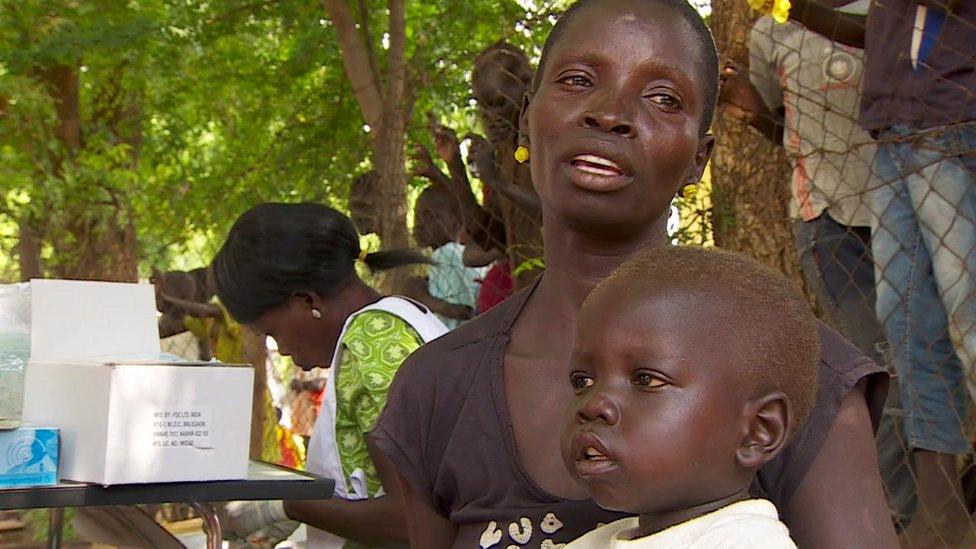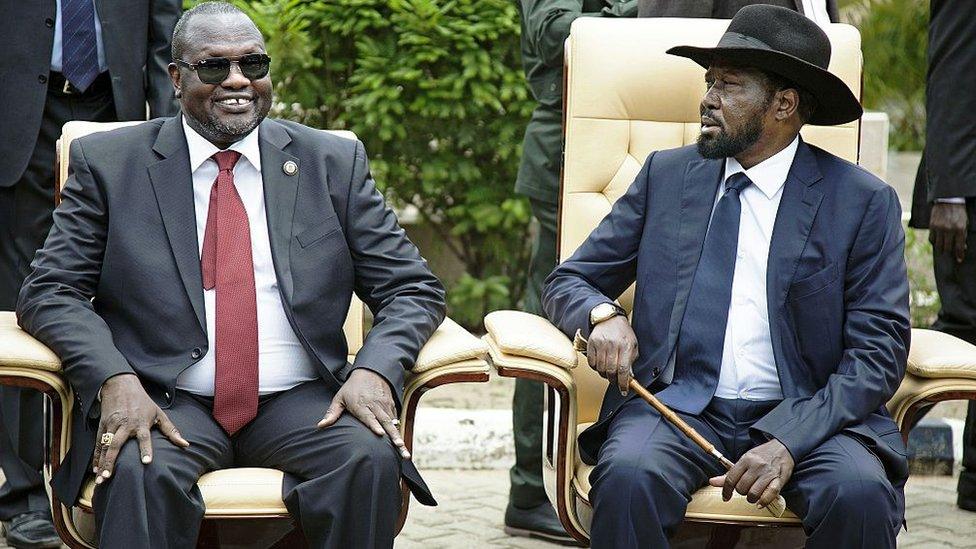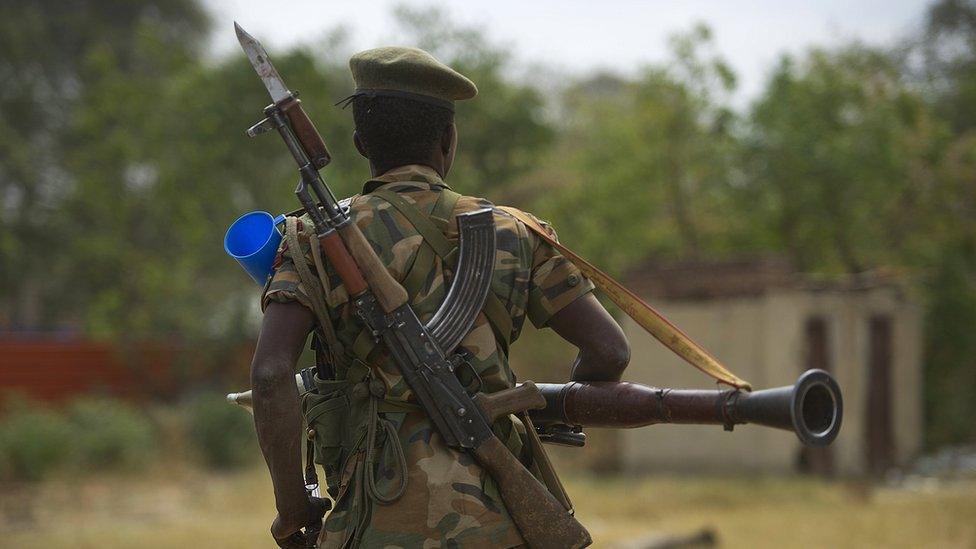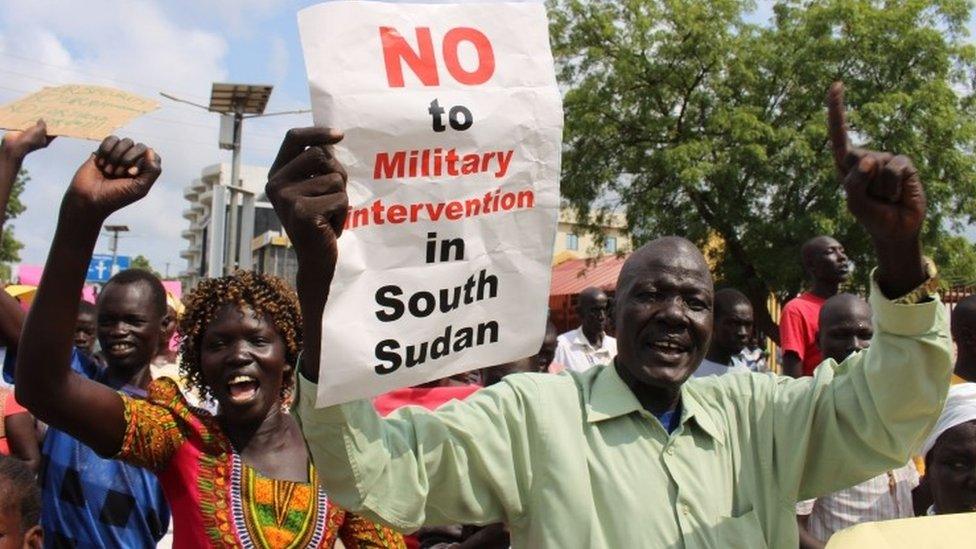South Sudan crisis: The wounds of war
- Published

Taban was hit by a bullet after soldiers stormed into his home
Two-year-old Taban screams with pain as a gaping bullet wound in his arm is cleaned and treated by a nurse in South Sudan's capital.
He is just one of the hundreds of patients who have gathered at the small open-air clinic in the grounds of St Theresa's - the Roman Catholic cathedral in Juba.
On Sunday, they sang for peace as a Nigerian cardinal, visiting from the Vatican, held the service and then delivered a letter from the Pope to President Salva Kiir, asking him - and his deputy - for that very same thing.
For three months the two men, whose political differences sparked civil war, have been sitting at the same table, trying to make a transitional government of national unity work.
That dramatically fell apart the night before South Sudan celebrated five years of independence in a barrage of bullets, which the president's spokesman said left 273 dead bodies lying in the street outside State House.
He showed us the bullet holes, the smashed glass, the blood-stained concrete, the empty brass casings, and he blamed someone else.
'Peace deal hangs by a thread'
It was bodyguards for opposition leader-turned first Vice-President Riek Machar and Mr Kiir's presidential guards who fought each other, sparking days of violence earlier this month which killed many hundreds of soldiers and civilians.

South Sudan's Vice-President Riek Machar (L) and President Salva Kiir (R) have been locked in a power struggle
Bizarrely, both leaders were inside the building at the time, as were the city's press corps - they videoed themselves cowering as the gunfire erupted around them.
As the shooting stopped, the two men gave a joint press conference appealing for calm.
That the fighting continued for the next few days is either a sign they that do not control their troops, or they care more about settling scores than they do about their people.
The man who went from vice-president to opposition leader and back to vice-president again says it was an attack on him.

Eugene Owusu, Unmiss deputy head

"This represents, in my view, a major reversal for South Sudan - and also undermines prospects for the peace agreement going forward"

Many of Mr Machar's best troops were killed and he fled the capital. It is not known where he is and, as South Sudan's peace deal hangs by a thread, it appears he is back to being an opposition leader again.
Amid talk of rifts within the opposition, the president says the peace deal both men signed still stands, and that Mr Machar can return to the capital and take up his old job.
Mr Machar has called for a neutral force to police the peace in Juba, but the president does not agree.
The African Union has pledged to send troops, but President Kiir says he does not want or need them.

South Sudan descended into chaos in December 2013, just over two years after independence
The United Nations has been piling on the pressure. The UN struggled to keep civilians safe in this latest round of fighting and is concerned about where this leaves the peace deal.
"This represents, in my view, a major reversal for South Sudan, and also undermines prospects for the peace agreement going forward," said Eugene Owusu, the deputy head of the United Nations Mission in South Sudan (Unmiss).
"I really do hope that with the big guns in Juba being silent, the main protagonists will see the primacy of peace and to ensure that the people of this country can live a life of peace and prosperity and dignity."
Collecting bodies
When the fighting started, UN peacekeepers were blocked from getting more than 500m from their bases by government checkpoints.
Thousands of people rushed into the already crowded protection of civilian camp known as UN House in Juba.
Its numbers swelled to more than 35,000 as heavy fighting took place nearby.
Water trucks were not able to deliver the 150 loads required every day, and a shell hit an armoured UN vehicle inside the base. Two peacekeepers were killed and others injured.
Close by to UN House, international aid workers were attacked by soldiers - some were raped and badly beaten. The UN was unable to reach them to help.
A World Food Programme warehouse containing enough food for 220,000 people for a month was completely looted - even the fabric of the building was taken.
"I think the mission is very, very constrained in terms of resources," said Mr Owusu.
"So we could absolutely do with additional resources, both in terms of human capabilities and also in terms of assets like helicopters."

More on South Sudan's crisis:


And in the meantime the humanitarian crisis is deepening.
Journalists still were not able to visit UN House amid security fears, but aid organisations set up clinics and help-points around Juba.
"Every day, we are seeing 400 people in our mobile clinics - the problems are malaria, malnutrition - we are seeing a lot of severe acute malnutrition," said Dr Farah Hussein from Medecins Sans Frontieres (MSF).
That does not happen in a week - it comes from years of war and a collapsed economy. South Sudan now has the highest inflation rate in the world at 300%.

Supporters of President Kiir do not want a deployment of foreign troops
It was an MSF nurse who was treating Taban, and many other patients in the cathedral grounds.
Bodies are still being collected by the Red Cross around Juba and there are still reports of gunshots.
We will probably never know how many people died the weekend the world's youngest country celebrated its fifth birthday - or of all the terrible things that happened when the guns and rockets were being fired across its capital.
The emphasis is now on the leaders to lead - and to put the people ahead of the politics.
There seems little hope for the unity government with Mr Machar weakened and not in town - though his place could be taken by another.
Either way it is not the road to stability South Sudan appeared to be on before the fighting broke out at State House.